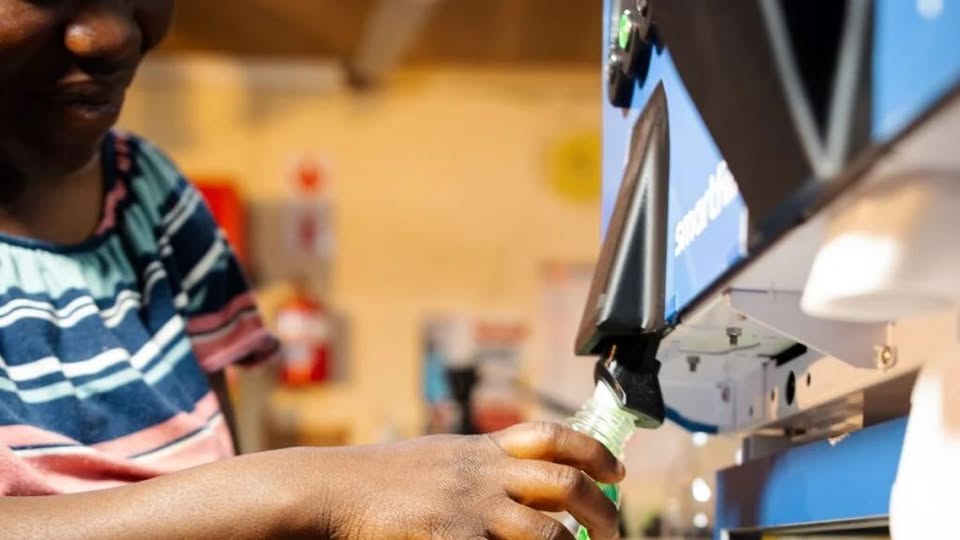Business
Smartfill’s Refill Revolution: The Township Grocery Trend Making Food Up To 50% Cheaper

A quiet revolution is unfolding in South Africa’s township economy, and it’s happening one refill at a time. A new grocery trend, powered by Smartfill dispensers, is transforming the way locals buy their daily essentials and doing so at prices up to 50% cheaper than major supermarket chains like Shoprite, Pick n Pay, and Checkers.
How Smartfill Works
Imagine walking into your local spaza shop and buying exactly the amount of cooking oil, rice, or washing powder you need no fancy packaging, no waste, just what your wallet allows that day. That’s the promise of Smartfill, a South African innovation developed by DY|DX and the Smollan Group.
The dispensers, already rolling out in areas like Tembisa in Johannesburg, let customers refill reusable containers with trusted household brands. The idea is simple but powerful: eliminate the cost of packaging and let people buy in smaller, affordable quantities.
By removing single-use plastics, Smartfill isn’t just helping shoppers save money it’s also tackling one of South Africa’s biggest environmental challenges.
Designed For The Township Economy
Smartfill’s strategy targets the heart of South Africa’s informal retail sector, where around 40% of the country’s fast-moving consumer goods (FMCG) are sold through spaza shops and local traders.
“We started Smartfill five years ago as an R&D project to meet the demand from FMCG manufacturers to innovate in this market,” explained Michael Smollan, Chief Growth Officer at the Smollan Group. “Consumers are engaging deeply, and sales of small refills are growing rapidly.”
Unlike supermarket chains that often draw customers away from small businesses, Smartfill aims to strengthen spaza shops by driving more foot traffic into them.
“Smartfill is about more than sustainability; it’s about affordability, dignity, convenience, and community,” said CEO Nevo Hadas. “Families can buy trusted brands in quantities that match their budget, while spaza owners see higher footfall and sales.”
The Rise Of Refill Culture
South Africans are already embracing the model. Smartfill has recorded over 30,000 transactions, with nearly a third of customers returning daily to top up their essentials.
From maize meal to washing powder, products from brands like Sunlight, B-Well, Golden Key, and Mielie King are now available in refill form allowing households to stretch every rand without compromising on quality.
The initiative also aligns with national sustainability goals. By promoting refill systems, Smartfill supports a circular economy that reduces plastic waste while easing the financial burden on working-class families.
A Growing Movement Beyond South Africa
The success of Smartfill has caught international attention. The company is now piloting projects in Bangladesh and Kenya, with expansion plans into Zambia.
Closer to home, a similar concept store called Skubu recently opened in Diepsloot, Johannesburg. Developed in collaboration with the Department of Science, Technology and Innovation, the CSIR, and local tech company Sonke, Skubu uses automated refill stations to sell essentials like rice, sugar, and detergent at prices up to 50% lower than conventional retail.
“It’s a fully automated refill store where people can buy exactly what they need, at prices they can afford,” said Eben de Jongh, founder of Sonke.
Government partners have praised the innovation for combining sustainability with economic empowerment. As Dr Mmboneni Muofhe from the Department of Science, Technology and Innovation noted, initiatives like Smartfill and Skubu “reflect a broader national effort to support local enterprise while promoting sustainable consumption.”
A Small Change With Big Impact
In townships where many families shop multiple times a month sometimes with only R20 or R50 to spare the ability to buy essentials in smaller quantities can make a world of difference.
Smartfill isn’t just changing how people shop; it’s redefining what accessibility and dignity mean in the South African retail landscape.
From Tembisa to Diepsloot, a quiet shift is underway one that proves innovation doesn’t always mean disruption. Sometimes, it’s about refilling what was already there: community, sustainability, and a fairer way to shop.
{Source: Business Tech}
Follow Joburg ETC on Facebook, Twitter , TikTok and Instagram
For more News in Johannesburg, visit joburgetc.com



























